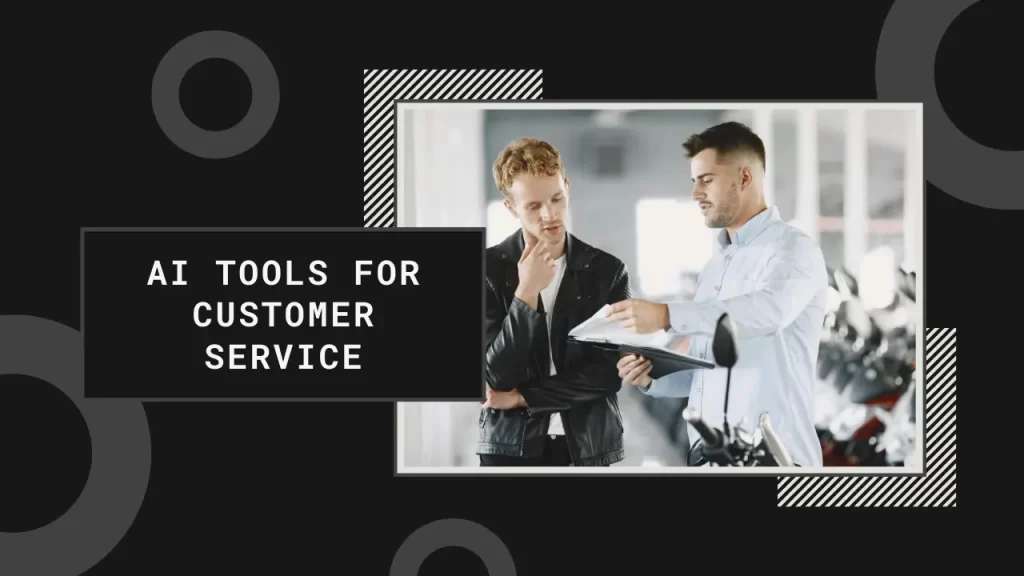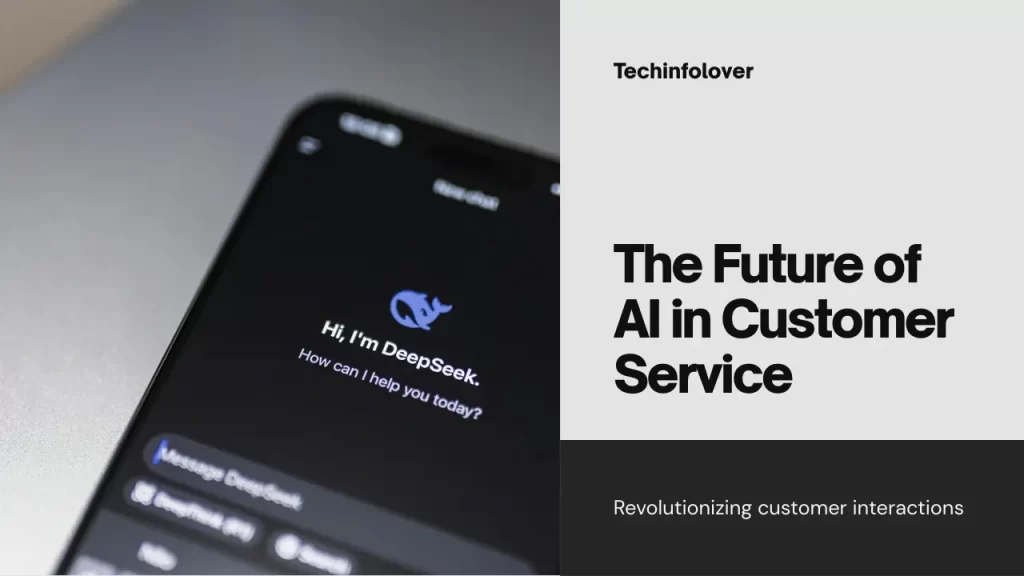Introduction: The Future of Customer Service with AI
Customer service has always been a critical function for businesses looking to foster loyalty, enhance user experiences, and improve overall satisfaction. In the fast-paced digital world of 2025, AI tools for customer service are redefining how businesses interact with their customers.
By leveraging machine learning, natural language processing (NLP), and predictive analytics, AI is now playing a pivotal role in automating routine tasks, improving response times, and enhancing personalization. Whether it’s answering FAQs, resolving issues, or providing recommendations, AI is empowering businesses to deliver exceptional customer experiences.
Main Objective: This article explores how AI tools for customer service are transforming industries, offering solutions to common challenges, and helping businesses meet customer expectations in the digital age.

What Are AI Tools for Customer Service?
AI tools for customer service encompass a variety of software solutions that use artificial intelligence to automate, assist, and improve customer interactions. These tools utilize a combination of machine learning, NLP, and data analytics to process customer queries, predict needs, and provide real-time assistance across different touchpoints—chat, email, phone, and social media.
Types of AI Tools Used in Customer Service
- AI Chatbots: These tools engage with customers in real time, offering automated answers to frequently asked questions (FAQs) or resolving common issues. Examples include Zendesk Answer Bot and Drift.
- Virtual Assistants: AI assistants like Amazon Alexa for Business and Google Assistant for Customer Service perform more advanced tasks, such as booking appointments or processing orders.
- Automated Ticketing Systems: AI-driven systems like Freshdesk and Zoho Desk help route customer queries to the right agents and prioritize tickets based on urgency and importance.
- Sentiment Analysis Tools: Platforms like MonkeyLearn use AI to gauge customer emotions from text (e.g., support emails, reviews), helping agents understand the sentiment behind each interaction.
Why Use AI Tools for Customer Service?
In the past, customer service was primarily human-driven, with agents handling every interaction manually. Today, businesses face increasing customer demands, longer wait times, and the pressure to provide seamless, round-the-clock support. This is where AI tools can make a significant difference. Here are some key benefits of implementing AI in customer service:
| Benefit | Explanation |
|---|---|
| Faster Response Times | AI tools can handle multiple queries simultaneously, significantly reducing wait times. |
| 24/7 Availability | AI-driven systems can operate around the clock, ensuring customers always have access to support. |
| Personalized Experiences | By analyzing customer data, AI tools can offer personalized recommendations and responses. |
| Cost-Effective | Automating routine tasks frees up human agents for more complex issues, reducing operational costs. |
| Improved Customer Insights | AI tools gather valuable data on customer preferences, behavior, and trends, which can be used for better decision-making. |
Top AI Tools for Customer Service in 2025
The AI customer service landscape is rapidly evolving, with several innovative tools leading the way. Let’s explore some of the top AI-driven solutions available today:
1. Zendesk Answer Bot
- Use: AI-driven chatbots that handle common customer queries.
- Features: Multilingual support, seamless integration with Zendesk support suite, and advanced machine learning capabilities for better answers.
- Best For: Businesses looking for an easy-to-implement AI solution for support and FAQ automation.
- Website: zendesk.com
2. Freshdesk
- Use: AI-powered ticketing system that automates ticket routing and prioritization.
- Features: Custom workflows, automatic ticket escalation, and an AI-driven helpdesk solution.
- Best For: Companies that need a customizable ticketing system that integrates with existing support tools.
- Website: freshdesk.com
3. Drift
- Use: AI chatbot for real-time engagement with customers.
- Features: Automates live chat conversations, qualifying leads, and scheduling meetings.
- Best For: Sales teams and customer service departments looking for lead generation and support.
- Website: drift.com
4. LivePerson
- Use: AI-powered conversational messaging platform for customer service.
- Features: Natural language processing (NLP) for human-like conversations, omnichannel support (SMS, email, chat).
- Best For: Enterprises that need a scalable, intelligent messaging platform.
- Website: liveperson.com
5. Zoho Desk
- Use: AI-powered helpdesk software that automates customer support workflows.
- Features: Contextual ticket management, multilingual support, and AI-driven sentiment analysis.
- Best For: Small to medium-sized businesses looking for cost-effective AI support tools.
- Website: zoho.com/desk
6. Ada
- Use: AI-powered chatbot platform for customer service.
- Features: No-code interface, multilingual support, analytics, and integration with major platforms like Slack and Salesforce.
- Best For: Businesses looking for an easy-to-deploy, customizable AI chatbot for customer service.
- Website: ada.support
7. MonkeyLearn
- Use: AI-powered text analysis tool for sentiment analysis.
- Features: Automates the categorization of customer feedback, reviews, and support tickets.
- Best For: Companies looking to analyze customer emotions and improve their service.
- Website: monkeylearn.com
8. ServiceTitan
- Use: AI-driven software for managing customer service in home service industries.
- Features: AI-powered scheduling, technician dispatch, and real-time tracking.
- Best For: Home service businesses such as plumbing, HVAC, and electrical services.
- Website: servicetitan.com
How AI Improves Customer Experience
AI tools for customer service are not just about automating responses—they’re designed to enhance the overall customer experience (CX). Here’s how AI is shaping CX:
-
Personalization
AI tools analyze customer interactions and preferences, offering tailored responses and product recommendations. For example, Zendesk Answer Bot customizes responses based on past interactions, ensuring customers receive more relevant and timely help. -
Faster Resolutions
AI can instantly identify and resolve simple issues, reducing resolution times. In more complex cases, AI tools like Drift or Freshdesk route tickets to the most suitable human agent, ensuring a quick and efficient handoff. -
Seamless Omnichannel Support
AI enables businesses to provide consistent support across multiple channels. Whether a customer reaches out via chat, email, or social media, tools like LivePerson and Zoho Desk ensure that the experience is smooth and unified.
Challenges of Using AI in Customer Service
While AI tools provide numerous advantages, businesses should be mindful of the challenges that come with their implementation:
1. Customer Trust
Some customers may be hesitant to interact with AI, fearing impersonal or inaccurate responses. Businesses must ensure AI tools are transparent, easy to use, and offer the option to speak with a human when necessary.
2. Quality Control
AI tools need continuous training to ensure they understand evolving customer queries. Regular updates and data analysis are essential to maintain high-quality service.
3. Data Privacy Concerns
As AI tools gather and process customer data, businesses must ensure they are adhering to data privacy laws such as GDPR. Secure data handling and transparency about how data is used are key to maintaining customer trust.

The Future of AI in Customer Service
AI tools for customer service are expected to continue evolving and improving in the coming years. Here are some trends to watch:
-
Hyper-Personalization
AI will become even better at predicting and delivering personalized experiences for each customer based on their behavior and preferences. -
AI-Driven Emotional Intelligence
AI systems will enhance their ability to understand and respond to customer emotions, creating more empathetic and effective interactions. -
Automation of Complex Tasks
AI tools will automate not only basic tasks but also more complex processes, such as resolving intricate issues or offering advanced troubleshooting.
FAQs About AI Tools for Customer Service
Q1. How can AI improve my customer service operations?
AI can automate routine tasks, offer 24/7 support, enhance personalization, and provide valuable insights to help improve customer satisfaction.
Q2. Are AI chatbots capable of replacing human agents?
No, AI chatbots are designed to assist and support human agents. They handle basic queries while more complex issues are escalated to human agents.
Q3. How can AI tools help with customer feedback?
AI tools like MonkeyLearn and Zendesk Answer Bot analyze customer feedback, helping businesses identify common issues, monitor sentiment, and improve service.
Q4. How do I ensure my AI tools are effective in customer service?
Regularly update and train your AI tools, monitor performance, and provide an option for customers to escalate to human agents when necessary.
Conclusion
AI tools are revolutionizing customer service by providing efficient, personalized, and cost-effective solutions. From chatbots to automated ticketing systems, AI is transforming how businesses interact with customers, improving response times, and boosting overall satisfaction. As AI technology continues to advance, businesses must adapt, ensuring that they implement ethical, transparent, and effective AI solutions.
By choosing the right tools and leveraging AI’s full potential, businesses can stay ahead of the competition and deliver exceptional customer service experiences.

